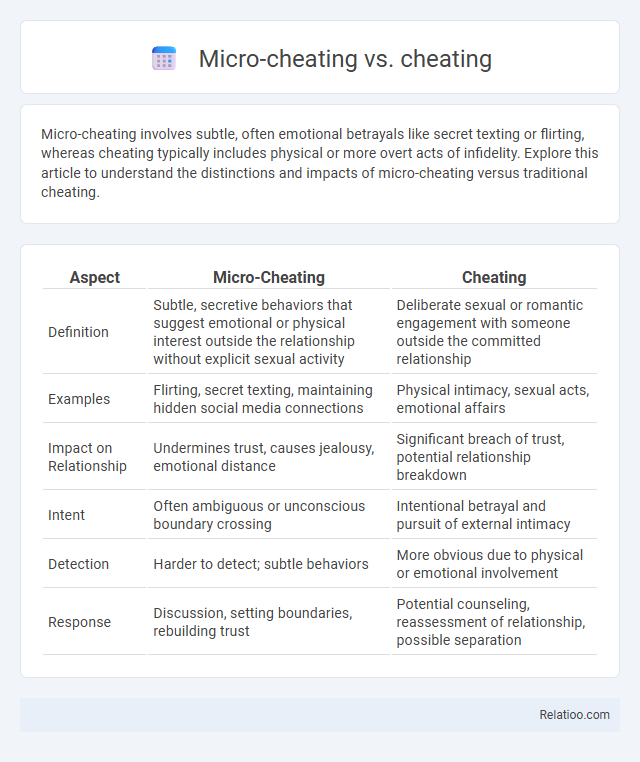Micro-cheating involves subtle, often emotional betrayals like secret texting or flirting, whereas cheating typically includes physical or more overt acts of infidelity. Explore this article to understand the distinctions and impacts of micro-cheating versus traditional cheating.
Table of Comparison
| Aspect | Micro-Cheating | Cheating |
|---|---|---|
| Definition | Subtle, secretive behaviors that suggest emotional or physical interest outside the relationship without explicit sexual activity | Deliberate sexual or romantic engagement with someone outside the committed relationship |
| Examples | Flirting, secret texting, maintaining hidden social media connections | Physical intimacy, sexual acts, emotional affairs |
| Impact on Relationship | Undermines trust, causes jealousy, emotional distance | Significant breach of trust, potential relationship breakdown |
| Intent | Often ambiguous or unconscious boundary crossing | Intentional betrayal and pursuit of external intimacy |
| Detection | Harder to detect; subtle behaviors | More obvious due to physical or emotional involvement |
| Response | Discussion, setting boundaries, rebuilding trust | Potential counseling, reassessment of relationship, possible separation |
Understanding Micro-Cheating: Definition and Examples
Micro-cheating involves subtle behaviors that hint at emotional or physical infidelity without overtly crossing traditional cheating boundaries. Examples include secretive texting with someone outside your relationship, hiding social media interactions, or maintaining emotional intimacy with a person other than your partner. Understanding micro-cheating helps you recognize these patterns early, protecting your relationship's trust before they escalate into full-blown cheating.
What Constitutes Traditional Cheating?
Traditional cheating involves engaging in sexual or emotional activities outside a committed relationship without partner consent, including physical intimacy, secretive communication, or developing romantic connections. Unlike micro-cheating, which includes subtle behaviors like flirting or hiding interactions that may undermine trust, traditional cheating typically includes explicit, deliberate actions that breach agreed relationship boundaries. Understanding these distinctions helps clarify the severity and impact of different breaches of fidelity in romantic partnerships.
Key Differences Between Micro-Cheating and Cheating
Micro-cheating involves subtle emotional or physical actions that breach relationship boundaries without full betrayal, such as secretive texting or flirting, whereas cheating constitutes explicit infidelity or physical intimacy with someone outside the relationship. The key differences lie in intent and impact: micro-cheating often reflects unmet emotional needs or insecurity, while cheating denotes a conscious decision to violate trust and commitment. Understanding these distinctions helps in addressing underlying issues and setting clear relationship expectations.
Common Signs of Micro-Cheating in Relationships
Common signs of micro-cheating in relationships include secretive behavior with phones, such as deleting messages or hiding conversations, frequent flirty interactions with others on social media, and emotional intimacy that crosses boundaries without physical contact. Your partner may also downplay these actions, insisting they are harmless, but such behaviors can erode trust and create emotional distance. Recognizing these subtle signs early enables you to address concerns before they escalate into full-blown cheating.
Psychological Impact of Micro-Cheating on Partners
Micro-cheating, characterized by subtle actions like secretive texting or emotional intimacy with others, can severely erode trust and induce anxiety in partners, even without physical betrayal. Unlike overt cheating, which involves clear boundary violations, micro-cheating blurs relational lines, leading to confusion and emotional distress that can undermine relationship stability. Psychological impacts include lowered self-esteem, heightened jealousy, and feelings of insecurity, emphasizing the need for transparent communication to mitigate these effects.
Why Micro-Cheating Matters: Emotional Boundaries
Micro-cheating matters because it subtly breaches emotional boundaries without overt physical infidelity, risking trust and intimacy in relationships. Your partner may feel misunderstood or undervalued when small acts like secret texting or emotional flirting occur, blurring lines between harmless interaction and betrayal. Recognizing micro-cheating helps maintain clear emotional boundaries essential for a healthy and transparent relationship.
Can Micro-Cheating Lead to Physical Infidelity?
Micro-cheating involves subtle behaviors that suggest emotional or physical attraction outside a committed relationship, such as frequent texting or flirting with someone else. While micro-cheating may seem insignificant, it can erode trust and emotional boundaries, potentially escalating into physical infidelity if unchecked. Research indicates that micro-cheating often acts as a precursor to more serious breaches of fidelity, making it a critical factor in relationship dynamics and infidelity prevention.
Navigating Trust: How Couples Address Micro-Cheating
Micro-cheating involves subtle behaviors like secretive texting or emotional connections that blur relationship boundaries, distinct from outright cheating which typically includes physical or sexual infidelity. Navigating trust requires open communication and clear definitions of acceptable behavior to prevent misunderstandings and rebuild security between partners. Couples who address micro-cheating proactively can enhance transparency, reinforce commitment, and maintain emotional intimacy crucial for a healthy relationship.
Setting Healthy Boundaries to Prevent Cheating
Setting healthy boundaries is crucial in distinguishing micro-cheating from outright cheating and preventing relationship erosion. Your clear expectations about communication, emotional involvement, and privacy can reduce misunderstandings and build trust. Defining these limits helps protect your relationship from subtle betrayals like micro-cheating, which often precede more serious infidelity.
Communication Strategies for Relationship Security
Micro-cheating involves subtle actions like flirting or secret texting that threaten trust without overt betrayal, while outright cheating entails clear breaches such as physical or emotional infidelity. Effective communication strategies for relationship security emphasize honesty, setting clear boundaries, and regularly discussing expectations to prevent misunderstandings related to micro-cheating behaviors. Prioritizing open dialogue helps You identify and address concerns early, fostering a secure and transparent partnership.

Infographic: Micro-cheating vs Cheating
 relatioo.com
relatioo.com